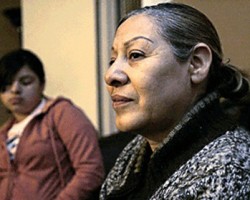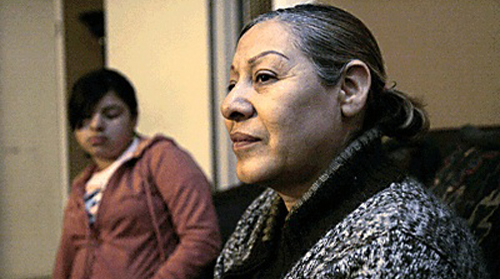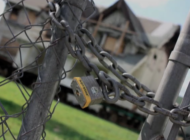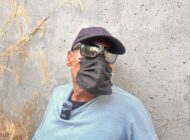One in 20 Mexican Americans ages 45 or older are raising a grandchild, a rate four times higher than that of non-Hispanic whites. Many of these granparents suffer from severe health problems and poverty.
Maria Olvera is among 2.6 million U.S. grandparents doing primary childcare for their grandchildren. Older Latinos like her face special challenges—and worries. Maria Olvera is pictured above with Valory, one of the two grandchildren she is raising in Altadena, Calif. Photo: Sarah Reingewirtz courtesy of San Gabriel Valley News Group. Por ADOLFO FLORES LOS ANGELES, Calif.–Researchers liken health coverage for grandparent caregivers to oxygen masks in an airplane. How can they look after the children when they’re not taking care of themselves? Yet like so many grandparents, Maria Olvera, 51, neglected her health because she was caught between job obligations and taking care of her grandchildren, Richard, age two, and his sister, Jennifer, 10. Their father was killed two years go in a drive-by shooting, and their mother was deported in 2010. It got to the point where Olvera was beginning to lose her sight because of her untreated diabetes. According to the U.S. Census Bureau, 6.4 million grandparents were living in households with grandchildren under age 18 in 2008, and 2.6 million of them had primary responsibility for parenting their grandchildren. Health coverage is one of the challenges grandparents face when taking on the parental role again, said Jaia Peterson Lent of Generations United, in Washington, D.C. Seeking medical coverage for themselves and the children is crucial. And without the proper information some families can lose out. Illiterate, Undocumented and Afraid “There’s always a challenge related to lack of information. Medicaid usually always covers children,” Lent said. “But often times grandparents aren’t aware of how to apply, what steps to take. Or they’re not sure if they even qualify. I’ve heard of cases when older adults use up their retirement savings.” Olvera depends heavily on the Madison Healthy Start Family program at Pasadena’s Madison Elementary School for guidance on how to get Medicaid coverage for the kids, schedule medical appointments for her and buy groceries. The center does everything from helping families with food to taking them to the hospital and going over letters they receive in the mail. A majority of the parents are women. “She was always very hesitant to seek help; we would have to go to her home sometimes because she was afraid we would take the kids away,” Mirsa Serrano, the Madison program’s coordinator, said of Olvera. “It’s hard for her to move forward because she has so many issues besides being illiterate and undocumented.” Besides being diabetic, Olvera suffers from depression, stemming from years of abuse at the hands of her former husband. Olvera said she’s doing a better job of taking care of herself. Still, 2010 was a difficult year for her, she said. Her brother died in January and her Mom passed away in July. “The past couple of months have been hard; some days I couldn’t even get out of bed. I don’t think I would’ve if it hadn’t been for the kids,” Olvera said, looking at her grandson Richard toddle by. The need for specified outreach to grandparents like Olvera is evident in a brown file container she has brimming with victim’s rights documents and information on how to get a federal U-Visa, as a survivor of domestic abuse. Yet, because she is unable to speak English–and more importantly scared and intimidated by the U.S. legal system–the papers have sat in the file unused for years. Those resources could’ve helped give her stability. More Active, But Vulnerable A 2009 study of ethnic grandparents raising their grandchildren, from Washington University in St. Louis, found that grandparent caregivers have a more active lifestyle, healthier meals and enhance their sense of purpose through the task of raising these children. However the same inquiry found compounding evidence that grandparent caregivers were more likely to be dissatisfied with their health; to have chronic diseases, such as diabetes; and have higher rates of depression than caregivers who look after their spouses or adult-child. Latino caregivers were much less healthy than their noncaregiving counterparts, said Esme Fuller-Thomson and Sandra Rotman of the University of Toronto, leading researchers on issues facing grandparents. “They were worse off, they had fewer financial resources, [and were] poorer,” Fuller-Thomson said, “when they’re the ones that should have more resources–it’s illogical.” In general, she said, grandparents who step forward are especially vulnerable. The task of raising a child can accelerate their health decline or make them more aware of their health limitations. Fuller-Thomson’s 2007 study with the University of California, Berkeley’s Meredith Minkler, “Mexican American Grandparents Raising Grandchildren” found that one in 20 Mexican Americans ages 45 or older are raising a grandchild. In spite of being among the most impoverished individuals, Fuller-Thomson noted, very few use public assistance programs, such as food stamps. Numbers for Central Americans were similar. Even though a quarter of these grandparents live below the poverty line, only one percent accessed social assistance. Stymied By Language, System “The use of services is so low, even if the grandmother is here legally she may still be frightened of using services,” Fuller-Thomson said. “There is an extra need to reach out to this group of caregivers.” Besides issues of legal status, language barriers and unfamiliarity in navigating the system may stymie their efforts. Removing them, by conducting outreach is crucial, she said. “Grandparent caregivers are the first line of defense for Americas most vulnerable kids,” Fuller-Thomson said. “Anything we can do to facilitate the well being of grandparents and give them stability makes sense,” she said, adding, “Many who are doing it suffer from severe health problems and poverty.” The 2010 U.S. Census figures show that Latinos are now constitute more than one-third of California’s population (37.6 percent,), noted Catherine Goodman, a retired professor from California State University, Long Beach who has done extensive research on grandparent caregivers. “As the Latino population increases, all these family types will increase,” including more families in which Latino grandparents are their grandchildren’s sole caregivers, Goodman said. She emphasized, “These families will need the same types of assistance as families of other ethnic groups, such as respite care, financial assistance, health insurance, linkage to services and schools and support from other family members and friends.” While grandchildren are typically born in the U.S., and therefore citizens, the grandparents raising them may not be. For those who are undocumented, accessing health care is fraught with fear, Goodman said. She continued that California has almost 3 million of the nation’s 11.6 million undocumented immigrants according the 2008 census data, Goodman said, but Goodman admited it’s hard to get an accurate count. “Costs are also a deterrent and often hospital emergency rooms are the only source of assistance,” Goodman said. “Therefore barriers to health care are poverty and low-income, lack of health insurance and legal status, as well as language.” The poor health of these grandparents could lead to their inability to care for their grandchildren, Goodman added. If parents neglect their children and families cannot provide for their youth, the child welfare system becomes responsible and children are placed in foster care or group homes. Steps to Independence Are Distant Because Olvera’s grandchildren are citizens of the United States, she hopes that eventually she will gain full custody and become their foster parent. Richard’s father, Rudolfo Reyes, would have alleviated the burden of looking after the kids, Olvera said, including others his wife had by other fathers. “He didn’t care that the other kids weren’t his,” Olvera said. “He would take them to school and on weekends to the park.” Reyes was killed in 2008, three days after Christmas, Olvera said. A death certificate indicated Reyes died of multiple gunshots. Olvera said he had no gang affiliations. “It was even more difficult for me after he died,” Olvera said. “I worked, I had to take care of the kids and take them to school.” The steps toward independence are far away, Olvera said. But she’s hopeful that one day she will see both her needs and those of the children fully met. For now she’d be happy with a job. “Once I get a job, I can move out of here with the kids into our own place,” Olvera said. This is the second article in a series by Adolfo Flores a staff writer at the Pasadena News Star. He wrote this article under a MetLife Foundation Journalists Fellowship in conjunction with New America Media (NAM) and the Gerontological Society of America. A Spanish-language version of this story will appear in El Nuevo Sol, as well as NAM.

EL NUEVO SOL











